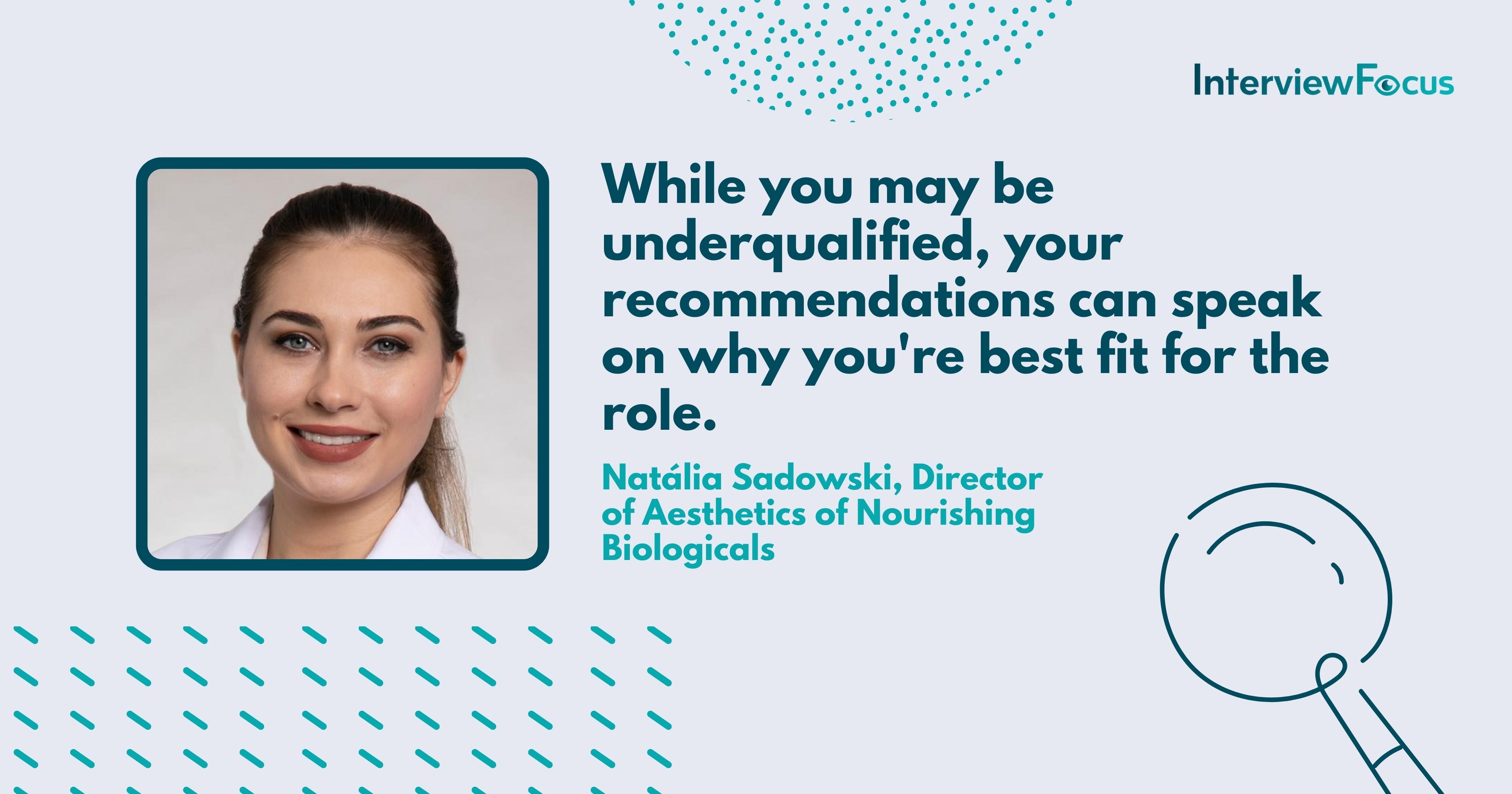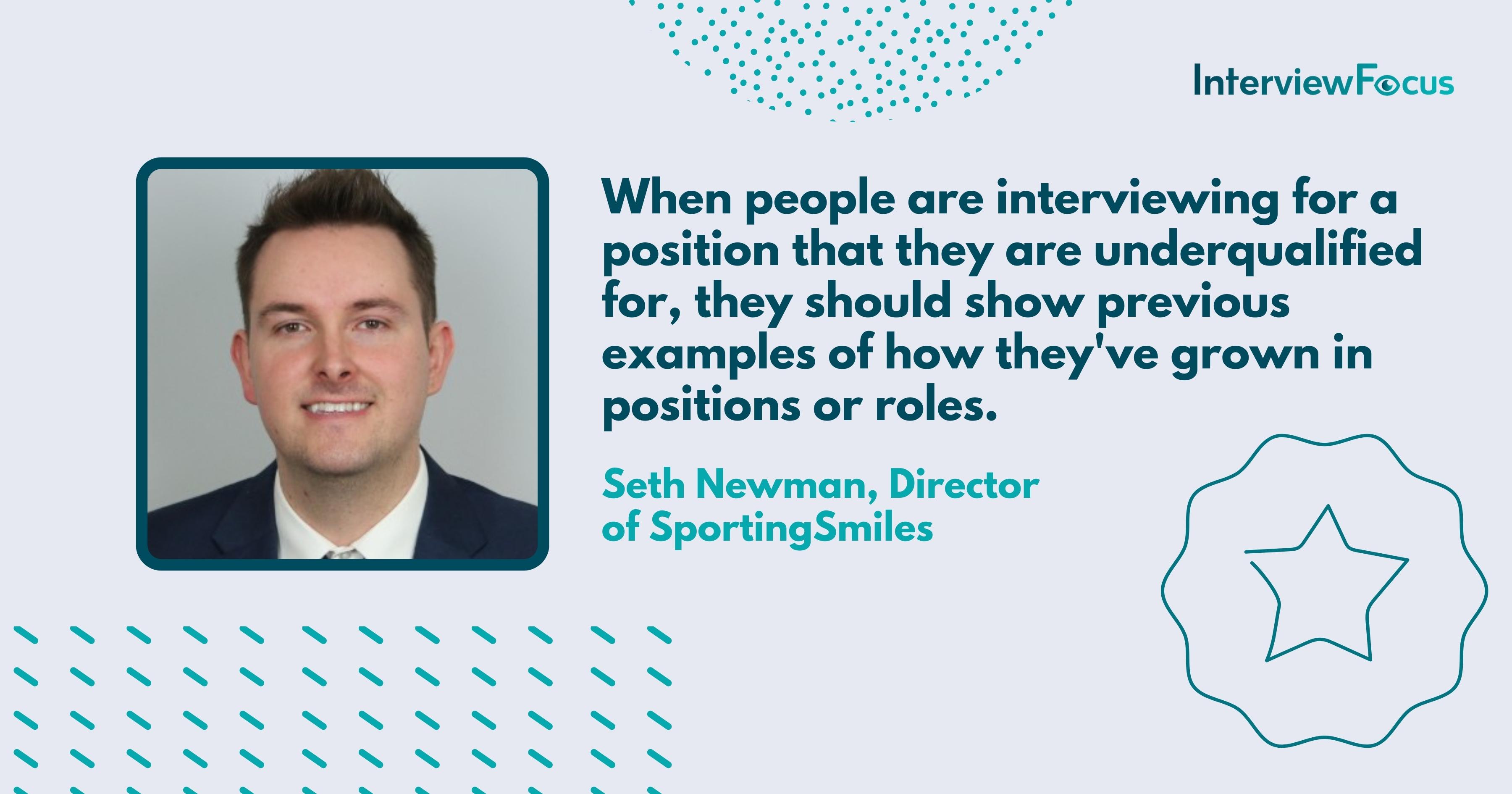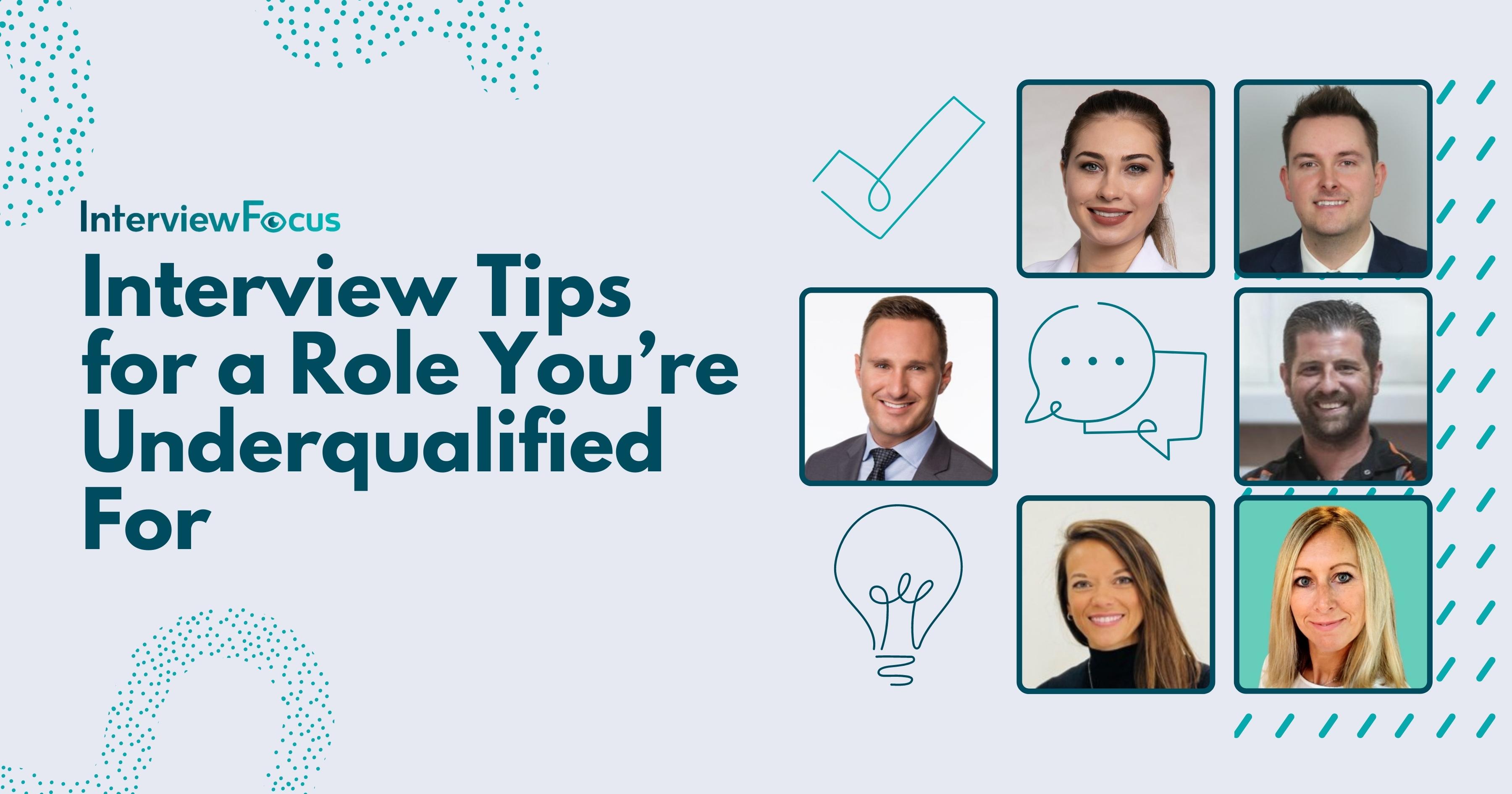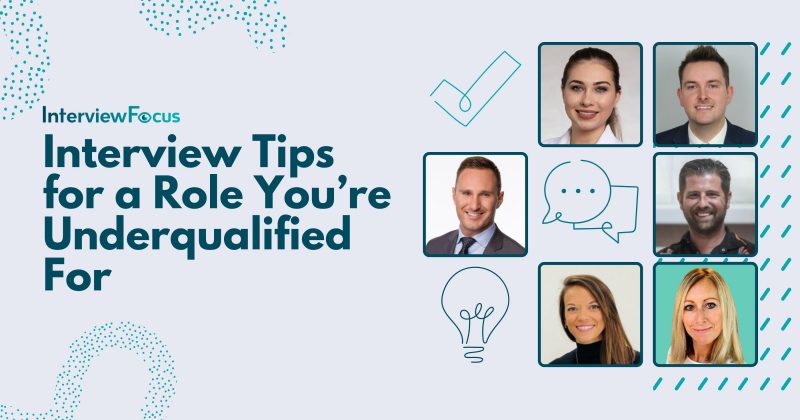Give your best interview tip for a role that someone is underqualified for?
To help you interview for a role that you may be underqualified for, we asked CEOs and hiring managers this question for their best pieces of advice. From creating a personal SWOT analysis to highlighting your soft skills, there are several tips to help show your interviewer that even though you may be underqualified, you portray professionalism and grit to go after a role that you desire.
Here are 14 interview tips to help you land a role you may be underqualified for:
- Create a Personal SWOT Analysis
- Do Your Research On the Company
- Be Enthusiastic
- Present a Growth and Development Plan
- Be Honest and Upfront About Your Experience
- Have Good Recommendations
- Show Growth in Previous Positions
- Be Bold
- Highlight the Qualifications You Do Meet
- Learn to Sell Yourself to Secure Your Desired Role
- Confidence is Key
- Show Them How You Learn Fast
- Portray Goal-Orientedness
- Highlight Your Soft Skills
Create a Personal SWOT Analysis
If you are interviewing for a role that you are under-qualified for, the best thing to do is undertake a SWOT (Strengths, weaknesses, opportunities, and threats) analysis and come up with examples of where you can use your transferable skills for areas that you don’t have experience.
You will likely identify strengths that you can bring over and above the role description, but also be ready with a plan of how you will quickly bridge any skills gaps to gain the competence required. Interviewers love to see passion and initiative, and if you are able to demonstrate both of these through this process, you are more likely to be offered the role.
Ineke McMahon, Director, Path to Promotion
Do Your Research On the Company
I have hired over a hundred employees during my 15 years of running my company. Now that hiring has become more difficult it’s an excellent opportunity for a candidate to get a position over their skill level. I recently hired a candidate who was underqualified for the role but she did her research on our company and came into the interview prepared. She knew about all our products and even about what our competitors were doing. The candidate even ordered our product before the interview. This really showed me that she wanted the position and was willing to learn and put in the effort to acquire the skills needed to do the job. We decided that this was a candidate we were willing to train and take a risk on hiring even though she was underqualified. If you’re going into a job you really want, do the extra homework on the company and show that you are willing to go the extra mile for the position.
Evan McCarthy, President CEO, SportingSmiles
Be Enthusiastic
If someone is underqualified for a role, it’s essential to be enthusiastic during the interview. You shouldn’t mention your lack of qualifications in any discussion, but you should always emphasize your enthusiasm for the job, willingness to learn, and eagerness to do a good job. It’s always better to show interest in a job you’re not qualified for than to turn down opportunities to learn. If you want to get ahead, it’s not just a matter of getting good grades. You must be proactive about what you want and how to do it. Although you should not mention your lack of qualifications, you should always express your interest and willingness to work hard for the job.
Jacob Dayan, Co-founder and CEO, Community Tax
Present a Growth and Development Plan
Representing that you’re still growing into your role can be a way to help your chances when applying for a job you are underqualified for. There is a difference between hiring someone who has no skill in a role and hiring someone who is actively pursuing the skills needed for the job.
If you haven’t already acquired the needed credentials, it’s a good idea to let your potential employer know that you’re actively in the process of doing so. Whether that’s taking online courses, formal schooling or acquiring certifications, the most important aspect to show is a genuine drive to become the sort of employee that’s ideal to fill the role, even if you aren’t quite there yet. This may not sway every interviewer but it will certainly increase your chances if they know you’re committed to putting effort into your career path.
Max Schwartzapfel, CMO, Schwartzapfel Lawyers
Be Honest and Upfront About Your Experience
The best interview tip for someone who is underqualified for a role is to be honest and upfront about their experience and qualifications. It is much better to be upfront with an employer, rather than trying to hide the fact that you may not have all of the required skills or experience. This will allow you to focus on highlighting your strengths, and what you can bring to the role, which will help improve your chances of being successful in the interview.
Additionally, openly discussing your weaker areas and any steps that you are taking to address them can also be a great way to show that you are committed to growing and improving as an employee. By focusing on these strategies, it is possible to demonstrate that you have the potential to be a great fit for the role, even if you may not initially have all of the required experience.
Amira Irfan, Founder and CEO, A Self Guru
Have Good Recommendations
Be sure that your recommendations are top-notch. While you may be underqualified, your recommendations can speak on why you’re best fit for the role. They could speak about the positive energy you bring to the table or your willingness to learn. This allows hiring managers to get a sense of who you are as a worker and can look past the qualifications.
Natália Sadowski, Director of Aesthetics, Nourishing Biologicals

Show Growth in Previous Positions
Sometimes people have the right attitude and a great set of skills to be successful in a position that they don’t have much experience in or are underqualified for. When people are interviewing for a position that they are underqualified for, they should show previous examples of how they’ve grown in positions or roles. Maybe they started out as a specialist but were promoted to mid-level positions and then managerial roles after a short time. Growth like that is often replicated because of the work traits and attitude that that person possesses. Showing that you have ambition, the ability to learn quickly, and previous examples of growth within a role is a great trait to show off when interviewing for a position in which you don’t have much experience.
Seth Newman, Director, SportingSmiles

Be Bold
You’ve managed to get this far, so you must have a certain amount of audacity. This is a seriously underrated quality and one which you can keep channeling. Focus on being as confident, composed, and self-assured as possible, and keep telling yourself that you can do it. There was obviously something in your application that caused your potential employer to consider you for an interview. Read over it, and focus on all the skills, attributes, and qualities you have that could compensate for your lack of specific qualifications. You can use this as evidence to reassure yourself, and your prospective employer, that you have the potential to succeed in this position.
At the worst, you won’t make it through to the next stage, but you will have learned, and expanded your comfort zone. At best, you will favorably impress your interviewer, and continue your progress, perhaps landing the job. You’ve got nothing to lose and everything to gain, so be bold, brave, and believe in yourself.
Mario Cacciottolo, PR & Branding Manager , SBO
Highlight the Qualifications You Do Meet
First, candidates should know they’re not expected to meet every single requirement. I have successfully placed candidates who only met half of the qualifications, so it’s definitely possible to not just get hired but to thrive in a position where you don’t meet all the requirements.
I’m pointing this out because confidence is a big part of interviewing well in this situation. Know which skills you do have and be ready to highlight those. For the ones you lack, highlight similar skills that show you have a knowledge base in that area. If they ask directly about a skill or experience you absolutely don’t possess, admit your weakness in that area but show your ability to learn through past demonstrated success in acquiring new skills. It’s even better if you can demonstrate proactive efforts to fill in those skill gaps, like if you’re enrolled in a course or certification program in that area.
Matt Erhard, Managing Partner, Summit Search Group
Learn to Sell Yourself to Secure Your Desired Role
The study of sales and how to utilize sales tactics will serve you unmeasurably in making successful decisions and deals, big and small. If you are interviewing for a position that may be asking for more knowledge than you currently have, selling the hiring manager on positive qualities beyond your acquired skill set will open them up to evaluating aspects of your readiness they may have not done otherwise. There comes a time when you become so good at selling, you can convince people into doing something they usually wouldn’t do and this pertains directly to securing that desired role when interviewing. Opening the hiring manager up to the fact that you have more to offer than what’s on paper and that they will not be disappointed, is my best interview tip for under-qualified candidates.
Grant Barra, Senior Vice President of Operations, RELI Exchange
Confidence is Key
When it comes to interviews, confidence is key. Even if you’re applying for a role that you’re underqualified for, it’s important to project confidence and show that you have the potential to be a great fit for the position. One way to do this is to focus on your strengths and explain how they can be applied to the role you’re interviewing for. For example, if you’re a great problem solver, talk about how you would approach solving problems in the role you’re interviewing for. Additionally, it’s important to do your research and be prepared to answer questions about the company and the role itself. Showing that you’re knowledgeable and enthusiastic about the opportunity will go a long way in getting your foot in the door.
Louise Ogilvy, Recruitment Director, Propeller-Tech
Show Them How You Learn Fast
If you need to show a hiring manager that you have a track record of learning on the job, then have a few of those specific examples locked in your brain before you take part in the interview. Choose three best anecdotes and rehearse telling those stories. Effectively take the hiring manager back to that moment when you defied the odds and exceeded expectations. Think about how you can segue to one or more of those stories – and make it feel organic. Don’t just sit and wait for the interviewer to ask you a question along the lines of, “Why should I hire you and not someone who has more experience?” Find a way to squeeze in your ready-made answer. Don’t walk out of that interview without trying to convince the hiring manager that you have an aptitude for learning on the job and learning fast. Enter that interview like you have nothing to lose. You won’t feel the pressure that usually comes during a typical job interview. Use that freewheeling attitude to your advantage.
Emily Saunders, Chief Revenue Officer, eLuxury
Portray Goal-Orientedness
You may be underqualified for a role, but you can still do your best to sell yourself and your enthusiasm. To start, do not lie or embellish. Come clean about the skills that you have not mastered. However, if you can show complete self-awareness regarding what you have left to learn, you can still emphasize that you very much want to learn these things. If you are enthusiastic and goal-oriented, you may be able to land a role, even if you still have a lot of skills yet to master for it.
Nancy Eichler, Senior Vice President of Marketing & eCommerce, iwi life
Highlight Your Soft Skills
Experience and education can be gained, but things like emotional intelligence and sociability are very difficult to learn. Soft skills like this are very transferable, so focus on things like leadership, self-motivation, and creativity. Give tangible examples, like the time you led a team, beat a deadline, or saw a project to fruition. Dig deep and consider your entire history, not just your work history. Did you adapt to something in your personal life or help a friend with a difficult situation? Anything that makes you look like a dedicated team player who rises to face tough situations can help bridge the gap between you and more qualified workers.






